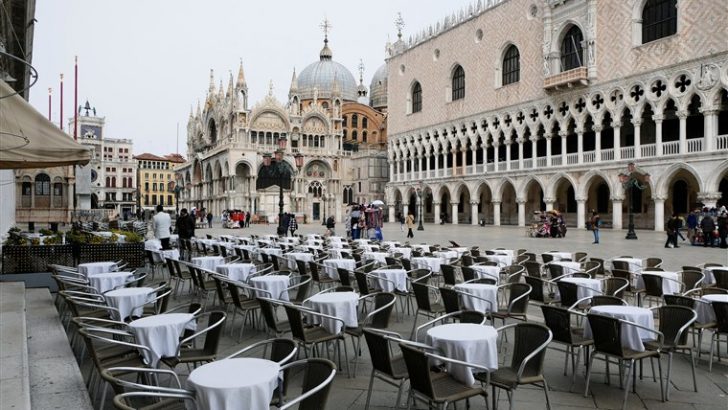The View
As we face another week in lockdown it would be easy to become discouraged, to wonder how on earth we can survive all this: these are difficult days.
However, it is sometimes important to put things into context and reflect on where we are from a wider perspective.
Yes, there are profoundly difficult days ahead. This virus has the potential to kill and has killed nearly 300,000 people worldwide. There are nearly four million cases across the globe. Some people will never know they had it, and others will come through it with relatively little suffering.
Some of those cases are in countries which are in a very different situation from ours – countries with no functioning health service capable of coping with sickness and death on the scale which could occur. Countries such as Syria, which is enduring a different kind of lockdown where the country has collapsed after the nine-year civil war in which nearly 400,000 people have died and almost 200,000 are missing, presumed dead; in which millions have been seriously injured and up to half the population displaced – seeking refuge where they can, their economy collapsed, their country destroyed.
It is in the context of that wider global tragedy that we, in Ireland, face the very difficult days ahead. Somehow, in the face of deprivation, unemployment, poverty and all that comes we will have to keep in our hearts a place for those whose lot is infinitely worse than that which we face.
Their suffering will be much worse than ours; their needs much greater; their prospects much poorer.
Prosperity
All is not gloom and doom though. It can be salutary to remember Ireland of the 1950s, 1960s and 1970s, before prosperity – such as it is – became widespread.
There are those alive today who remember walking to school barefoot, who remember that there was no general education for all, who left school at the age of 12 and 14, who remember great hunger and deprivation. I remember very well seeing barefoot children begging in Dublin when I was a little girl and being profoundly shocked. We were poor, but not that poor.
We will have to pay for what we are doing now in the days to come and it will be difficult”
Many alive today will remember an Ireland in which there were very few hotels, cafés, restaurants, businesses, shops or cars; very few opportunities really. It was an Ireland from which people emigrated in huge numbers seeking a future, because there was no future for so many here.
Although we do have great poverty in Ireland, north and south, although people are still emigrating for economic reasons, we will not start after Covid-19 with the kind of zero base we had in the 1970s. We have an infrastructure: transport, roads, health services, schools, colleges, universities – all key to the future prosperity of our country.
We have a functioning Constitution, Dáil Éirann in the South, the Assembly in the North, a judiciary, police service and a prison service to accommodate and attempt to rehabilitate convicted prisoners. We have an educated population – something which countries emerging from war and conflict often lack. We start from a sound base.
There are, of course, those who will benefit financially from the virus – those who seize the opportunity to provide goods and services in a different, often virtual way.
There are those who are exploiting the situation, buying and reselling personal protective equipment at exorbitant prices. In this, as in every adverse situation which the world has faced, there will be those who make their fortunes on the back of the suffering of others.
The global economy is a complex construct, but the end result of what happened was that we, too, enjoyed many of the good things we had, because other people laboured often in other lands in situations which were fundamentally wrong, working long hours yet not even earning enough to live on. This was wrong.
The challenge for us now is to face our new reality – we cannot go on indefinitely protecting people’s health at the cost of the loss of the economy which supports the way of life which we have now secured as a people. We will have to pay for what we are doing now in the days to come and it will be difficult. We will ultimately have to go back to work and to a way of life which will be different. We have learned to socially distance.
We have learned that danger lies in a virus which we can neither see, touch, taste, feel or hold. There have been previous viruses and there will be others in the future. Yet we have learned that many of us can work from home, that there are different ways of doing things. It is likely that all those journeys to work, involving both stress and expense, are not necessary – many people will be able to continue working from home.
We have seen bluer skies emerge as the world stopped travelling by plane, boat, train and car. We can hear the birds sing much more now, much of the background noise which dominated our world has, temporarily, ceased.
We have learned that the world can be different and that there is no inevitability to anything. We thought we had certainty. We thought, for the most part, that our world would just carry on as it was. Now we know that there is no such certainty in this world.
I think that to some degree the world had become a challenging place”
As a community, as a people, we have seen much unity, much selflessness and much courage in the way in which so many have responded. Surely we have to carry that unity of purpose, that courage and that recognition of the need to protect the common good into the future.
I think that to some degree the world had become a very challenging place as the rich got richer, and homelessness and extreme poverty had become again part of our lives. As Catholics we should reflect on what life had become. Together, now, we have faced the reality and the fear and in so doing we must make sure that we hear with absolute clarity the call which is fundamental to our faith: the call to love, the call to holiness. As a people we had, to some degree, lost our way, become trapped almost in an unhealthy cycle. Somehow we have to repurpose our ways of being so that we learn to cherish all our people in the days to come, and that we do so as a holy people.


 Nuala O’Loan
Nuala O’Loan Empty tables outside a restaurant at St. Mark's Square, in Venice.
Photo: Manuel Silvestri / Reuters
Empty tables outside a restaurant at St. Mark's Square, in Venice.
Photo: Manuel Silvestri / Reuters 